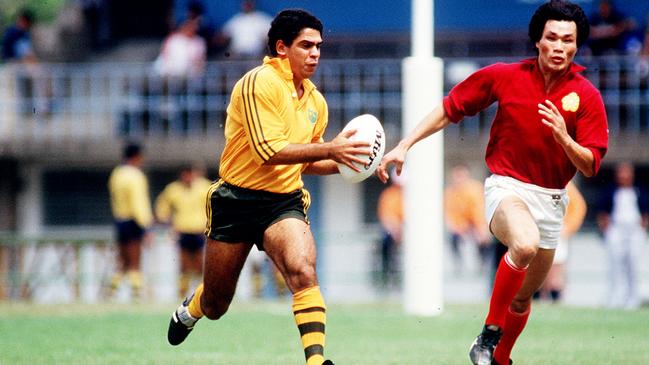Every Wallaby must do their duty but some do it better than others

Michael Hawker, Michael O’Connor and I came from three very different backgrounds and we complemented each other just as well off the field as we did on it, as our personalities reflected our style of play.
Former NSW coach Peter Crittle nicknamed Hawker “The Lord” because of his upper-crust origins.
Hawker, educated at the exclusive Shore school in North Sydney, was a typical GPS product. The aristocratic Hawker dreamt of owning a castle in England and was one of rugby’s gentlemen.
On tour Hawker would wear a coat and tie to breakfast and I remember on the 1982 tour to New Zealand he even wore a tie on a fishing trip.
If Hawker was “The Lord” then Michael O’Connor was the Jester.
O’Connor and his close friend, Wallaby flanker Chris Roche, were dubbed ‘Null and Void’ by their teammates because of their absent-mindedness. They had the distinction of being the only duty boys to be sacked in the history of the Australian Barbarians.
The Baa Baas toured northern Australia in 1981 and the team’s manager, Charles Blunt, made the mistake of rooming O’Connor and Roche together.
They were late for a team meeting in Mt Isa and Blunt made them duty boys for three days as a punishment but he was only punishing himself.
When the team assembled at Mt Isa airport for a flight to Townsville, O’Connor and Roche gave out our air tickets to the team and found that they had a spare ticket left over.
The vague duo suddenly realised that they had left Eastwood winger, Ian Robertson, asleep in the team’s hotel.
The importance of the role of team duty boy was highlighted to me in 1980 when New Zealand toured Australia. Wallaby manager Ken Donald made me duty boy for one day leading up to the third and deciding Test in Sydney after I wore sandshoes to breakfast.
I was supposed to wake the team up the following morning for training but I slept through the alarm as the team assembled on the bus. There were two players missing, my roommate Paul McLean and myself.
The unimpressed Donald said that I would have to be duty boy for another day because of my slight lapse but I replied —“It’s National Aboriginal Day and if you make me duty boy today I’ll get Al Grassby (then the Commissioner for Community Relations) onto you”, so Donald had no choice but to let me off.
Success in the lives of all people often derives from a coincidence of factors and this was certainly true when I ascended to the Wallaby captaincy for the 1982 tour of New Zealand.
Rumours of several established Test players making themselves unavailable for the tour were in circulation as soon as the Wallabies returned home from Britain the year before.
The whispers were confirmed when nine members of the Test team that defeated Scotland advised the ARU of their unavailability for the New Zealand campaign.
The players, all from Queensland, were Mark Loane, Tony Shaw, Stan Pilecki, Bill Ross, Brendan Moon, Tony D’Arcy, Michael O’Connor, brothers Paul and Jeff McLean plus their cousin Peter.
The unavailability of Australia’s three most recent Test captains — Mark Loane, Tony Shaw and Paul McLean — presented the selectors with the task of choosing a new Wallaby skipper.
On the evening of the team announcement I was showing a mate from Queensland around Sydney as I was assured of a position in the touring party and didn’t bother to listen to any broadcasts to find out the composition of the team.
When I got home I received a congratulatory telephone call from Daily Telegraph journalist Jim Woodward. I thanked Woodward for his call but I asked him why he was making such a fuss over my selection in the team.
Woodward then broke the news of my appointment as Wallaby captain. I was in shock and had to sit down because I was shaking.
At the time I wished that the selectors had informed me first so I could have rejected it.
It was a strange situation because I had been chosen for one Test, dropped for the next Test match and then made Australian captain in the space of a week so try explaining that to someone.
It was not even a fairytale and I at the time I thought that it was a joke and like most rugby players I always suspected that the selectors are weird and that proved it!
I wasn’t happy about the captaincy because I wanted to establish myself as a Test five-eighth without the extra burden of leadership because I couldn’t secure my place in the Test team while Tony Melrose and Paul McLean were around and now that they were gone — Melrose had switched to rugby league — I wanted to prove I didn’t get the position by default.
At the end of the New Zealand tour, I said that the Wallabies were the underdogs and that we had nothing to lose. We also had a point to prove to the Australian public that we were capable of doing the job, without the excuses. We lost the series 2-1, but I think we made our point.



Rugby has always been my favourite sport because I was lucky enough to have played in the amateur days when we travelled regularly and got to know each other, playing just for the joy of the game and not how much money we can earn.